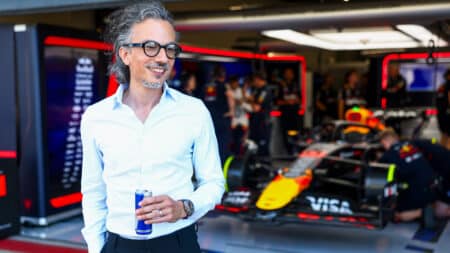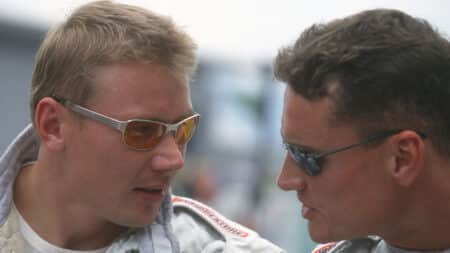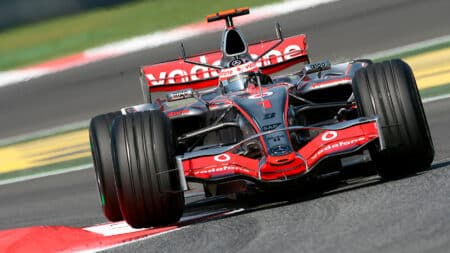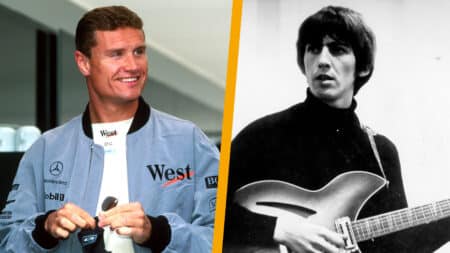
MPH: To the man trying to fill Christian Horner's shoes: good luck!
Laurent Mekies arrives as Red Bull F1 team principal with a series of immediate challenges to solve and long-term issues to tackle. He'll either sink or swim, says Mark Hughes
It was a pleasure last week, at a function unconnected with motor racing, to run into Martin Whitmarsh, whom I hadn’t seen since the palace coup at McLaren early in 2014: in rather unsavoury circumstances he was removed from office, whereupon the reins were again taken up by Ron Dennis.
It all happened at a board meeting. “Ron told me what he was going to do,” said Martin, “and within five minutes I’d walked out of the building…”
Since that day he has been much missed in the Formula 1 paddock, not least by journalists, myself included, for we not only enjoyed his sense of humour but also appreciated his unusual candour. Once Whitmarsh felt he could trust you not to let him down, he would take you into his confidence, and in F1 you don’t get many of those to the pound.

After seeing him again, I thought back to a chat we had in the summer of 2012. “This is my 24th year in F1,” Martin said, “and I’ve had a bloody good time, because I love the job I do. I’m very proud of being the fourth team principal of McLaren – but it isn’t actually going to define me. It’s odd, I think, that Ron still needs that more than I need it…
“I’m pretty fatalistic, though. If I got shot out of F1 tomorrow, I’d be shocked for 24 hours, but I’m also an optimist, and I’d get over it. I had a fantastic 10 years in aerospace, and loved it, then came into this industry, and I’ve got no regrets.”
I have to say that I rather doubt Dennis’s assertion that they are ‘still friends’, but eventually a financial accommodation was reached, and Whitmarsh is in the happy position of never having to work again.
As did Ross Brawn in his ‘gap year’ in 2007, Martin and his wife spent much of last year travelling, not least to visit their anthropologist daughter in Borneo, where she is working on a project with orangutans. That time, he says, has been very good for his soul, but he hasn’t lost his love of Formula 1.

With David Coulthard, 1998
“It was difficult at first – in fact, I quite consciously tried not to watch it on TV, because it was all very raw. But I’m past that now – I’ll always love the sport, and I’ll always love McLaren. I want to see them at the front again…”
It was Whitmarsh, in the autumn of 2013, who began the talks with Fernando Alonso about rejoining the team he left in contentious circumstances at the end of ’07. “Certainly we had our problems back then, but at the end of the day you always aim to have the best driver, and as far as I’m concerned that’s Fernando.
The chances of Alonso going back to McLaren seemed dead in the water when Whitmarsh was deposed, and Dennis was back in charge, but last season Eric Boullier was instrumental in persuading him to return, and Martin doesn’t doubt that ultimately the renewed alliance will succeed.
He, though, will not be part of it. Perhaps one day he will be involved in F1 again, but for now he has an entirely new challenge, as CEO of Ben Ainslie Racing, the team dedicated to winning the America’s Cup. Also on board, in a consultancy role, is Adrian Newey, with whom Whitmarsh worked for many years at McLaren, and if this played a big part in his decision, he admits he was leaning towards it anyway. “I had a meeting with Ben, and we didn’t even talk money. Within half an hour, I knew I wanted to do it…”

An impression I always had of Whitmarsh in F1 was that not only did he want to see McLaren thrive, but also the sport as a whole. Trust me, this is not universal. Although an absolute purist in the engineering sense, he admitted that he later came back somewhat from that position, in the sense that he accepted that the interests of the fans should not be ignored. “I might, for example, have been in favour of traction control, because it made the car more efficient,” he said to me once, “but on the other hand I could understand why the spectators didn’t like it…”
Martin also had strong views about the composition of the World Championship, and was angry when the Grand Prix at Indianapolis disappeared from the calendar because its owners could no longer countenance the financial demands of Bernie Ecclestone and the dread CVC Capital Partners. “We can’t turn our back on America,” he said. “Rather than leave everything in the hands of the promoter, and consider only who’s going to give us the most money to turn up and race, we should go to America strategically, perhaps with FOTA offering to support the race…”
Ah yes, FOTA, the sadly short-lived Formula One Teams Association, of which Whitmarsh was very much a backbone, taking over as chairman after the original incumbent, Luca di Montezemolo, stepped down. At the inaugural FOTA press conference, in March 2009, there was so much optimism in the air, and at one point in his address Luca said this: “What’s certain is that the time for ‘divide and conquer’ to rule in F1 is over”.

Sadly, no one had told Ecclestone, who had always found this policy highly successful, and did so again. Di Montezemolo’s enthusiasm for FOTA swiftly evaporated in the face of ‘fiscal incentive’: once Red Bull had been bought off by Bernie, Ferrari lost little time in following suit.
Whitmarsh worked hard at keeping FOTA alive, but without unanimity, its power base was gone, just as Ecclestone had intended, and I’ve always thought its demise disastrous for the sport. Now what we have is the F1 Strategy Group, which has power, but – for all its claims to the contrary – represents the interests of only some of the teams.
Will Whitmarsh one day work in F1 again? “It’s not impossible,” he said, “but I can’t say I’d want to go back into it as it is at the moment…”

Laurent Mekies arrives as Red Bull F1 team principal with a series of immediate challenges to solve and long-term issues to tackle. He'll either sink or swim, says Mark Hughes

Former McLaren F1 team-mates Mika Häkkinen and David Coulthard are set to renew old rivalries in a new Evening with... tour – they told James Elson all about it

In Formula 1, driver contracts may look iron-clad on paper, but history shows that some of its biggest stars have made dramatic early exits

Former McLaren F1 ace told James Elson about his private audience with The Beatles' George Harrison, who played an unreleased grand prix-themed song